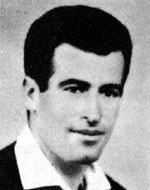Bitman, Rami
Son of-Israel and Zvia, who after the War of Independence joined the Yifat group when they came from Kfar Hahoresh, where Rami was born on March 9, 1937. In Yifat he is currently teaching at the regional high school and is also teaching (special education) Rami studied at the Yifat High School and was not a typical person, but was active in everything, and when he was drafted into the IDF in November 1956, he found himself in a training base. When he finished his officers’ course, he volunteered for a paratroop brigade and proudly put on his paratrooper’s red beret, and the good smile never left him when he had to perform responsible tasks. His commander testified that Rami was not the typical kibbutznik who was confident and knew everything, but on the contrary, he was debating and looking for his way in life, whether in the kibbutz or in the academic field. He was a regular student, and from his childhood he liked to be interested in various matters He was always looking for justice and honesty and protecting his comrades in the army from his superiors, because he saw in his friends’ actions the more civilian and military side of the human side. And after he was released from the army, he returned to the field of agriculture that he had always loved and the leisure hours before and after the shift, and devoted his books to his friends who had signed books. He demonstrated his great ability and willingness to delve into circles that devoted their time to various issues and Rami always came to these circles when he was ready and knew the subject. At the outbreak of the Six-Day War, Rami was again called to the flag and headed the reconnaissance unit that he himself established and was promoted to lieutenant. On June 6, 1966, the unit, in which Rami served, ran an armor battle in the Armored Corps; It was in the valley of Dotan, which is in Samaria. During the battle he was ordered to contact the enemy tanks and report the operation. Rami did so with coolness and courage. But five days later – and on the final day of the battles – he was on the 10th of June 1967, he fell in battle at the Banias level in the Golan Heights, and his loyalty to his position and his subordinates was impeccable and it is possible that he brought him to death, He went on to search for a way to continue the battle – and then he came upon a landmine that took his life, was buried in the military cemetery in Afula and later transferred to the cemetery in his group. By the Yifat group in memory of the members of the Union who fell in the campaign and the unification of the groups and kibbutzim He was brought from his estate, and his memory was published in a booklet published by the Kishon Regional Council, in the book of A. Golan, “The People of Steel.” In the investigation of the fallen sons of the fallen soldiers in Israel, 2017 It was emphasized that the Citation of the Brigade Commander was converted into a masterpiece.
